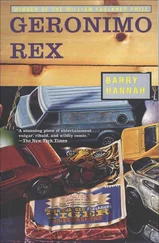“Are you still the mind, him the body?” Carina asked.
“Now more than ever. I’d say he now has about an eighth of the head he was given,” Levaster said.
“What happened?”
“He drowned. And then he lived,” Levaster said.
“Well, he looks happy.”
“I am happy,” said French Edward, coming back to the room. “Whose thing is this? You children break in Baby’s apartment and, not only that, you carry firearms. I don’t like any kind of gun. Who are these hoodlums you’re talking to, Baby?” Edward was carrying a double-barreled.410 shotgun/pistol; the handle was of cherrywood and silver vines embossed the length of the barrels.
“I’ll take that,” said Dr. Levaster, since it was his. It was his Central Park nighttime gun. The shells that went with it were loaded with popcorn. He ran the teen-agers out of his apartment, and when he returned, Edward was asleep on the couch, the sweet peace of the athlete beaming through his twisted curls.
“I’ve never slept like that,” Levaster said to Carina, who had remained. “Nor will I ever.”
“I saw him on TV once. It was a match in Boston, I think. I didn’t care a rat’s prick about tennis. But when I saw him, that face and in his shorts, wow. I told everybody to come here and watch this man.”
“He won that one,” Dr. Levaster said.
Levaster and Carina took a cab to Central Park. It was raining, which gave a congruous fashion to Levaster’s raincoat, wherein, at the left breast pocket, the shotgun/pistol hung in a cunning leather holster. Levaster swooned in the close nostalgia of the city. Everything was so exquisitely true and forthright. Not only was the vicious city there, but he, a meddlesome worthless loud failure from Vicksburg, was jammed amok in the viciousness himself, a willing lout in a nightmare. He stroked Carina’s thigh, rather enjoying her distaste.
They entered the park under a light broken by vandals. She came close to him near the dark hedges. What with the inconsequential introversion of his youth, in which he had not honed any skill but only squatted in derision of everything in Vicksburg, Levaster had missed the Southern hunting experience. This was more sporting, bait for muggers. They might have their own pistols, etc. He signaled Carina to lie on the grass and make with her act.
“Oh, I’m coming, I’m coming! And I’m so rich, rich, rich! Only money could make me come like this!”
The rain had stopped and a moon was pouring through the leaves. Two stout bums, one with a beer can opened in his hand, circled out of the bush and edged in on Carina. The armed bum made a threatening jab. In a small tenor voice, Levaster protested.
“Please! We’re only visitors here! Don’t take our money! Don’t tell my wife!” They came toward Levaster, who was speaking. “Do you fellows know Jesus? The Prince of Peace?” When they were six feet away, he shot them both in the thigh, whimpering, “Glory be! Sorry! Goodness. Oh, wasn’t that loud !”
After the accosters had stumbled away, astounded at being alive, Levaster sank into the usual fit of contrition. He removed his sunglasses. He seemed racked by the advantage of new vision. It was the first natural light he had seen since leaving French Edward’s house in Covington, across the bridge from New Orleans.
They took a cab back and passed by French Edward, asleep again. He had taken off his trousers and shirt, appeared to have shucked them off in the wild impatience of his sleep, like an infant, and the lithe clusters of his muscles rose and fell with his breathing. Carina sat on the bed with Levaster. He removed his raincoat and everything else. Over his spread-collar shirt was printed a sort of Confederate flag as drawn by a three-year-old with a sludge brush. Levaster wore it to Elaine’s to provoke fights but was ignored and never even got to buy a writer or actor a drink. Undressed, it was seen how oversized his head was and how foolishly outsized his sex, hanging large and purple, a slain ogre. Undressed, Levaster seemed more like a mutinous gland than a whole male figure. He jumped up and down on his bed, using it for a trampoline. Carina was appalled.
“I’m the worst, the awfulest!” he said. Carina gathered her bag and edged to the door. She said she was leaving. As he bounced on the bed, he saw her kneeling next to the couch with her hand on Edward’s wrist. “Hands off!” Levaster screamed. “No body without the mind! Besides, he’s married. A New Orleans woman wears his ring!” Jump, jump! “She makes you look like a chimney sweep. You chimney sweep!” Levaster bounced as Carina left.
He fell on the bed and moiled two minutes before going into black sleep. He dreamed. He dreamed about his own estranged wife, a crazy in Arizona who sent him photographs of herself with her hair cut shorter in every picture. She had a crew cut and was riding a horse out front of a cactus field in the last one. She thought hair interfered with rationality. Now she was happy, having become ugly as a rock. Levaster did not dream about himself and French Edward, although the dream lay on him like the bricks of an hysterical mansion.
In high school, Baby Levaster was the best tennis player. He was small but devious and could run and get the ball like a terrier. Dr. Word coached the college team. Dr. Word was a professor of botany and was suspected as the town queer. Word drew up close to the boys, holding them to show them the full backhand and forehand of tennis, snuggled up to their bodies and worked them like puppets as large as he was. Rumorers said Dr. Word got a thrill from the rear closeness to his players. But his team won the regional championship.
Dr. Word tried to coach Baby Levaster, but Levaster resisted being touched and handled like a big puppet and had heard Word was a queer. What he had heard was true — until a few months before French Edward came onto the courts.
Dr. Word first saw French Edward in a junior-high football game; the boy moved like a genius, finding all the openings, sprinting away from all the other boys on the field. French was the quarterback. He ran for a touchdown nearly every time the ball was centered to him, whenever the play was busted. The only thing that held him back was passing and handing off. Otherwise, he scored, or almost did. An absurd clutter of bodies would be gnashing behind him on the field. It was then that Dr. Word saw French’s mother, Olive, sitting in the bleachers, looking calm, auburn-haired and handsome. From then on Dr. Word was queer no more. Mrs. Edward was a secretary for the P.E. department, and Dr. Word was baldheaded and virile, suave with the grace of his Ph.D. from Michigan State, obtained years ago but still appropriating him some charm as an exotic scholar. Three weeks of tender words and French’s mother was his, in any shadow of Word’s choosing.
Curious and flaming like a pubescent, he caressed her on back roads and in the darkened basement of the gym, their trysts protected by his repute as a queer or, at the outside, an oyster. Her husband — a man turned lopsided and cycloptic by sports mania — never discovered them. It was her son, French Edward, who did, walking into his own home wearing sneakers and thus unheard — and unwitting — to discover them coiled infamously. Mr. Edward was away as an uninvited delegate to a rules-review board meeting of the Southeastern Conference in Mobile. French was not seen. He crawled under the bed of his room and slept so as to gather the episode into a dream that would vanish when he awoke. What he dreamed was exactly what he had just seen, with the addition that he was present in her room, practicing his strokes with ball and racket, using a great mirror as a backboard, while on the bed his mother and this man groaned in approval, a monstrous twin-headed nude spectator.
Читать дальше












